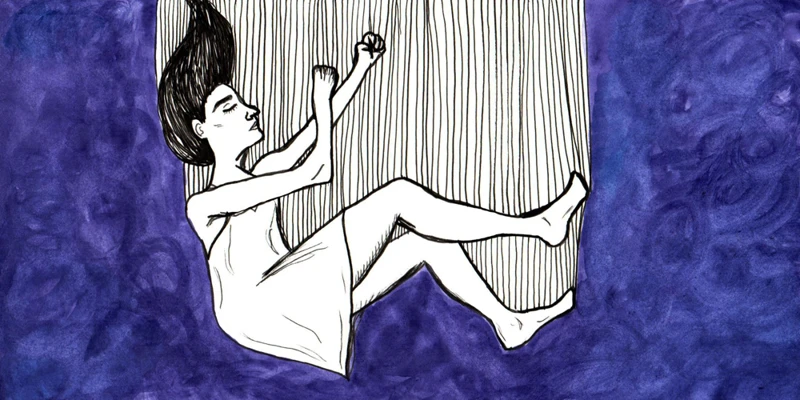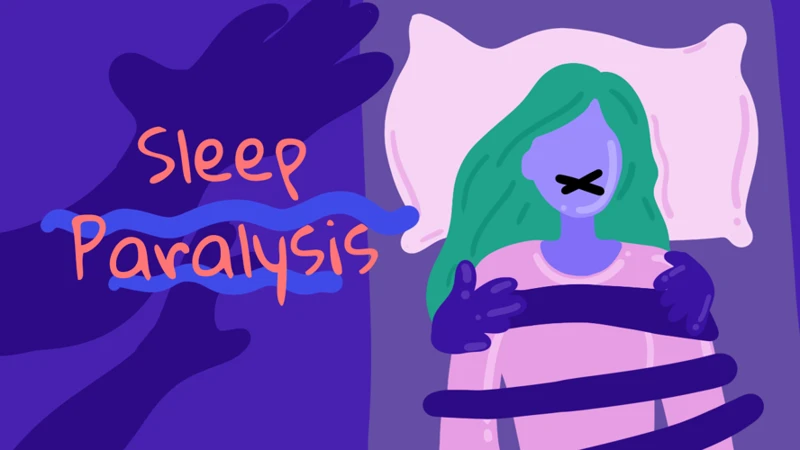The Role of Anxiety and Stress in Sleep Paralysis: Unraveling the Mysterious Connection Being jolted awake, unable to move, while experiencing vivid hallucinations can be a terrifying experience. Welcome to the world of sleep paralysis, a phenomenon that affects millions worldwide. But what exactly is sleep paralysis? Why does it happen? And what role do anxiety and stress play in triggering these episodes? In this article, we delve deep into the mysterious connection between anxiety, stress, and sleep paralysis, exploring the impact of anxiety on sleep quality, linking anxiety to sleep paralysis, examining the relationship between stress and sleep disturbances, and providing practical tips for managing anxiety and stress to promote better sleep. Join us on this intriguing journey as we unravel the enigma of sleep paralysis.
What is Sleep Paralysis?

Sleep paralysis is a perplexing phenomenon that occurs during the transition between sleep and wakefulness. It is characterized by a temporary inability to move or speak, often accompanied by hallucinations and a sense of impending danger. While experiencing sleep paralysis, individuals may feel immense pressure on their chests or a presence in the room, heightening feelings of fear and anxiety. The duration of sleep paralysis episodes can vary, with some lasting only a few seconds and others extending up to a couple of minutes. To learn more about the science behind sleep paralysis, its signs and symptoms, and how it is linked to anxiety and stress, you can explore our detailed article on exploring the science of sleep paralysis. Understanding sleep paralysis is the first step in unraveling the mysteries behind this eerie phenomenon that affects individuals around the world.
The Relationship Between Anxiety and Sleep Paralysis

Anxiety and sleep paralysis share a complex relationship, with each influencing the other in a delicate dance. Anxiety has a profound impact on sleep quality, leading to disturbances in the sleep cycle and an increased vulnerability to sleep paralysis episodes. The intense fear and panic experienced during an episode of sleep paralysis can also contribute to heightened anxiety levels, creating a vicious cycle. While the exact mechanisms underlying this relationship are still being studied, it is clear that addressing anxiety can play a significant role in managing sleep paralysis. To learn more about the signs and symptoms of sleep paralysis and gain a deeper understanding of this intricate relationship, you can refer to our article on sleep paralysis signs. By unraveling the connection between anxiety and sleep paralysis, we can pave the way for effective strategies to improve sleep quality and reduce the occurrence of these unsettling episodes.
1. Impact of Anxiety on Sleep Quality
1. Impact of Anxiety on Sleep Quality: Anxiety can have a significant impact on the quality of sleep that individuals experience. When anxiety levels are high, it becomes difficult for the mind to calm down and relax, making it challenging to fall asleep and stay asleep throughout the night. This can result in fragmented sleep, leading to daytime drowsiness and impaired cognitive function. Additionally, anxiety can amplify the intensity of dreams and nightmares, further disrupting the sleep cycle. These disturbances in sleep caused by anxiety can create an environment that is conducive to sleep paralysis episodes. To understand more about the relationship between anxiety and sleep paralysis, you can refer to our article on understanding sleep paralysis. By addressing and managing anxiety, individuals can improve their sleep quality and potentially reduce the occurrence of sleep paralysis episodes.
2. Linking Anxiety to Sleep Paralysis
Anxiety and sleep paralysis have a close and intricate relationship. Research suggests that anxiety can have a significant impact on sleep quality, making individuals more susceptible to experiencing sleep paralysis episodes. One possible explanation for this connection is the body’s natural stress response, also known as the ‘fight or flight’ response. When we experience anxiety, our body goes into high alert, releasing stress hormones like cortisol, which can disrupt the sleep cycle. This disruption can lead to fragmented or shallow sleep, increasing the likelihood of experiencing sleep paralysis episodes. Anxiety can heighten the emotional response to sleep paralysis, making the experience even more distressing. It becomes a vicious cycle, with anxiety leading to sleep paralysis, and sleep paralysis exacerbating anxiety. Understanding this link is crucial in finding effective strategies to manage anxiety and reduce the occurrence of sleep paralysis episodes. To learn more about the impact of anxiety on sleep quality and ways to mitigate its effects, explore our article on managing anxiety and stress for better sleep. By addressing anxiety, we can potentially break the cycle and improve sleep quality, reducing the occurrence of sleep paralysis.
The Connection Between Stress and Sleep Paralysis

Stress has long been recognized as a significant factor that can contribute to sleep disturbances and disorders, including sleep paralysis. The relationship between stress and sleep paralysis is complex, with stress acting as both a trigger and a consequence of sleep paralysis episodes. High levels of stress can disrupt the natural sleep-wake cycle, leading to decreased sleep quality and an increased likelihood of experiencing sleep paralysis. Additionally, the fear and anxiety that often accompany sleep paralysis can further exacerbate stress levels, creating a vicious cycle. To delve into this connection further, we explore the impact of stress on sleep disturbances and examine the relationship between stress and sleep paralysis in our comprehensive article on understanding sleep paralysis. Understanding the intricate role of stress in sleep paralysis is crucial for finding effective strategies to manage and prevent these episodes.
1. Stress and Sleep Disturbances
Stress can have a profound impact on our sleep, often leading to various sleep disturbances. When we are under stress, our bodies release stress hormones like cortisol, which can disrupt our natural sleep-wake cycle. This disruption can result in difficulty falling asleep, frequent awakenings throughout the night, or overall poor sleep quality. Additionally, stress can contribute to the development of insomnia, a sleep disorder characterized by persistent difficulties in falling asleep or staying asleep. Insomnia can further exacerbate stress levels, creating a vicious cycle. Stress can lead to an increase in muscle tension and arousal, making it harder for our bodies to relax and enter a restful state. To understand more about the connection between stress and sleep disturbances, it is important to explore the impact of stress on our sleep patterns and the strategies we can employ to mitigate its effects.
2. Examining the Relationship
Examining the relationship between stress and sleep paralysis reveals intriguing insights into the interplay between these two factors. Stress has long been recognized as a potential trigger for sleep disturbances, and sleep paralysis is no exception. When individuals experience high levels of stress, it can disrupt the normal sleep cycle, leading to sleep-related disorders such as sleep paralysis. Stress activates the body’s fight-or-flight response, releasing hormones like cortisol that can interfere with sleep patterns. Additionally, stress can contribute to increased muscle tension, making it more likely for individuals to wake up in the middle of the night and experience episodes of sleep paralysis. The fear and anxiety associated with sleep paralysis can create a vicious cycle, where the anticipation of an episode can increase stress levels, leading to more frequent occurrences. It is vital to understand the relationship between stress and sleep paralysis in order to effectively manage both and improve overall sleep quality.
Managing Anxiety and Stress for Better Sleep
Finding effective ways to manage anxiety and stress is crucial for promoting better sleep and reducing the likelihood of experiencing sleep paralysis. One highly recommended approach is cognitive-behavioral therapy (CBT), which focuses on identifying and challenging negative thoughts and behaviors that contribute to anxiety and stress. CBT can help individuals develop coping mechanisms and relaxation techniques to promote better sleep quality and reduce the occurrence of sleep paralysis episodes. Additionally, engaging in relaxation techniques such as deep breathing exercises, meditation, or mindfulness can help calm the mind and prepare the body for sleep. Regular physical activity and exercise can also help to alleviate anxiety and stress, promoting better sleep. Lastly, establishing and practicing healthy sleep habits, such as maintaining a consistent sleep schedule, creating a comfortable sleep environment, and avoiding stimulants before bedtime, can significantly contribute to a more restful slumber. Taking proactive steps to manage anxiety and stress not only benefits overall well-being but also helps to create an environment conducive to a peaceful sleep, reducing the risk of sleep paralysis.
1. Cognitive Behavioral Therapy (CBT)
Cognitive Behavioral Therapy (CBT) is a valuable therapeutic approach for managing anxiety and stress, which can in turn alleviate the occurrence of sleep paralysis. CBT aims to identify and modify negative thought patterns and behaviors that contribute to anxiety and stress. Through this type of therapy, individuals learn to challenge negative thoughts and develop more positive and realistic ways of thinking. By addressing the underlying anxiety and stress that may trigger sleep paralysis, CBT can help individuals regain control over their sleep and reduce the frequency of sleep paralysis episodes. Techniques commonly used in CBT include cognitive restructuring, where individuals learn to reframe negative thoughts and beliefs, and relaxation training, which involves teaching relaxation techniques such as deep breathing and progressive muscle relaxation. It is important to seek guidance from a qualified therapist specializing in CBT to receive tailored strategies and support in managing anxiety and stress effectively.
2. Relaxation Techniques
Relaxation techniques can play a crucial role in managing anxiety and stress, thereby promoting better sleep and potentially reducing the occurrence of sleep paralysis episodes. One effective technique is deep breathing exercises, which involve taking slow, deep breaths and focusing on the sensation of breathing. This can help activate the body’s relaxation response and calm the mind. Progressive muscle relaxation is another technique that involves systematically tensing and then releasing different muscle groups, promoting a sense of relaxation and easing muscle tension. Guided imagery is yet another technique that involves visualizing peaceful and calming scenes or scenarios, helping to redirect thoughts away from stress and anxiety. Additionally, practicing mindfulness meditation can be beneficial for managing stress and anxiety. By focusing on the present moment and non-judgmentally observing thoughts and emotions, individuals can cultivate a greater sense of calm and inner peace. Exploring and experimenting with different relaxation techniques can provide individuals with effective tools to alleviate anxiety and stress, promoting overall well-being and potentially reducing the frequency of sleep paralysis episodes.
3. Exercise and Physical Activity
Regular exercise and physical activity can play a crucial role in managing both anxiety and stress, which in turn can contribute to better quality sleep and potentially reduce the occurrence of sleep paralysis. Engaging in physical activity releases endorphins, also known as the “feel-good” hormones, which can help alleviate anxiety symptoms. Exercise promotes better sleep by reducing stress levels, promoting relaxation, and increasing the overall quality of sleep. It is important to find activities that you enjoy and incorporate them into your daily routine. This could include activities such as jogging, swimming, dancing, or joining a fitness class. In addition to the physical benefits, exercise can also provide a sense of accomplishment and boost self-confidence. Remember to start slowly and gradually increase the intensity and duration of your workouts as appropriate.
4. Healthy Sleep Habits
4. Healthy Sleep Habits
Developing and maintaining healthy sleep habits is crucial for managing anxiety and stress, and ultimately improving sleep quality. Here are some effective habits to incorporate into your nighttime routine:
1. Stick to a Consistent Sleep Schedule: Going to bed and waking up at the same time every day helps regulate your body’s internal clock. Aim for a consistent sleep schedule, even on weekends, to establish a healthy sleep-wake cycle.
2. Create a Soothing Bedtime Routine: Engaging in relaxing activities before bed can signal to your body that it’s time to wind down. Consider activities such as reading a book, taking a warm bath, or practicing deep breathing exercises to promote relaxation.
3. Create a Sleep-Friendly Environment: Make your bedroom a haven for quality sleep. Keep the room cool, dark, and quiet. Use earplugs, an eye mask, or white noise machines if necessary. Also, invest in a comfortable mattress and pillows that support your body.
4. Avoid Stimulants and Electronics: Limit the consumption of caffeine, nicotine, and alcohol, particularly close to bedtime. Additionally, avoid the use of electronic devices, such as smartphones and laptops, as the blue light emitted can interfere with melatonin production and disrupt sleep.
5. Exercise Regularly: Engaging in regular physical activity can help reduce anxiety and promote better sleep. Aim for at least 30 minutes of moderate-intensity exercise most days of the week, but avoid exercising too close to bedtime as it may leave you feeling too energized to fall asleep.
6. Manage Stress Before Bed: Find healthy ways to manage stress in the evening. Consider journaling, practicing mindfulness or meditation, or listening to calming music to relax your mind before sleep.
By incorporating these healthy sleep habits into your routine, you can create an environment and lifestyle that supports restful sleep and reduces anxiety and stress. Remember, consistency is key when it comes to establishing healthy sleep patterns.
Conclusion
In conclusion, anxiety and stress can play a significant role in the occurrence of sleep paralysis. The impact of anxiety on sleep quality can disrupt the natural sleep cycle and increase the likelihood of experiencing sleep paralysis episodes. Additionally, the link between anxiety and sleep paralysis is reinforced by the shared symptoms of both, such as heightened feelings of fear and a sense of imminent danger. Stress, too, can contribute to sleep disturbances and potentially trigger sleep paralysis episodes. However, managing anxiety and stress through various techniques, such as cognitive-behavioral therapy (CBT), relaxation techniques, exercise, and healthy sleep habits, can help promote better sleep and reduce the occurrence of sleep paralysis. By addressing anxiety and stress levels, individuals can take control of their sleep health and minimize the frequency and intensity of sleep paralysis experiences. Remember, if you or someone you know experiences sleep paralysis regularly and it significantly impacts their daily life, it is advisable to consult with a healthcare professional for proper evaluation and guidance.
Frequently Asked Questions
1. What causes sleep paralysis?
Sleep paralysis can be caused by various factors, including sleep deprivation, irregular sleep schedule, jet lag, changes in sleep routines, and underlying sleep disorders such as narcolepsy.
2. Are there any risk factors for sleep paralysis?
Yes, certain factors can increase the likelihood of experiencing sleep paralysis. These include having a family history of sleep paralysis or sleep disorders, suffering from mental health conditions like anxiety and depression, and experiencing high levels of stress.
3. Can anxiety trigger sleep paralysis?
Anxiety can indeed trigger sleep paralysis. Stress and anxiety can disrupt normal sleep patterns, leading to an increased likelihood of experiencing sleep paralysis episodes.
4. Is sleep paralysis dangerous?
Sleep paralysis itself is not considered dangerous. While the experience can be unsettling and frightening, it is typically harmless. However, the fear and anxiety associated with sleep paralysis can have a negative impact on sleep quality and overall well-being.
5. Can sleep paralysis be treated?
While there is no specific cure for sleep paralysis, certain strategies can help manage and reduce its occurrence. These include improving sleep hygiene, managing stress and anxiety, and treating underlying sleep disorders, if present.
6. Is sleep paralysis a sign of a sleep disorder?
Sleep paralysis can be a symptom of different sleep disorders, including narcolepsy. However, not everyone who experiences sleep paralysis has an underlying sleep disorder.
7. Are there any prevention techniques for sleep paralysis?
Although it is not always possible to prevent sleep paralysis entirely, adopting healthy sleep habits can help reduce the frequency of episodes. This includes maintaining a consistent sleep schedule, creating a relaxing bedtime routine, and ensuring a comfortable sleep environment.
8. What is the connection between sleep paralysis and lucid dreaming?
Lucid dreaming is the phenomenon where individuals are aware that they are dreaming and can sometimes exert control over their dream. Sleep paralysis can occasionally occur when transitioning in or out of a lucid dream, as the body remains temporarily paralyzed while the mind becomes conscious.
9. Can medication help with sleep paralysis?
While there are no specific medications for sleep paralysis, certain medications used to treat underlying sleep disorders or anxiety and depression may indirectly reduce the occurrence of sleep paralysis episodes.
10. When should I seek medical help for sleep paralysis?
If you frequently experience sleep paralysis and it significantly affects your sleep quality, daily functioning, or mental well-being, it is advisable to consult a healthcare professional who specializes in sleep disorders.








